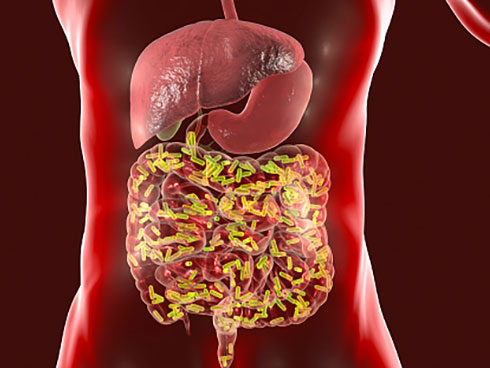In some instances, the abnormal function can be demonstrated by tests (for example, gastric emptying studies or antro-duodenal motility studies). However, the tests often are complex, are not widely available, and do not reliably detect functional abnormalities.
Occasionally, diseases that are thought to be functional are ultimately found to be associated with abnormalities that can be seen by the naked eye or under the microscope. Then, the disease moves out of the functional category. An example of this would be Helicobacter pylori (H. pylori) infection of the stomach. Some patients with mild upper gastrointestinal symptoms who were thought to have abnormal function of the stomach or intestines have been found to have stomachs infected with H. pylori. This infection can be diagnosed under a microscope by identifying the bacterium in biopsies from the stomach. When patients are treated with antibiotics, H. pylori and symptoms disappear. Thus, recognition of infections with Helicobacter pylori has removed some patients’ symptoms from the functional disease category.
The distinction between functional disease and non-functional disease may be blurry. Thus, even functional diseases probably have associated biochemical or molecular abnormalities that ultimately will be able to be measured. For example, functional diseases of the stomach and intestines may be shown ultimately to be associated with reduced or increased levels of normal chemicals within the gastrointestinal organs, the spinal cord, or the brain. Should a disease that is demonstrated to be due to a reduced or increased chemical still be considered a functional disease? In this theoretical situation, we can’t see the abnormality with the naked eye or the microscope, but we can measure it. If we can measure an associated or causative abnormality, should the disease no longer be considered functional, even though the disease (symptoms) are being caused by abnormal function? The answer is unclear.
Despite the shortcomings of the term functional, the concept of a functional abnormality is useful for approaching many of the symptoms originating from the muscular organs of the gastrointestinal tract. To repeat, this concept applies to those symptoms for which there are no associated abnormalities that can be seen with the naked eye or the microscope.
While dyspepsia is a major functional disease(s), it is important to mention several other functional diseases. A second major functional disease is irritable bowel syndrome or IBS. The symptoms of IBS are thought to originate primarily from the small intestine and/or colon. The symptoms of IBS include abdominal pain that is accompanied by alterations in bowel movements (defecation), primarily constipation or diarrhea. Indigestion and IBS may be overlapping diseases since up to half of patients with IBS also have symptoms of indigestion. A third distinct functional disorder is non-cardiac chest pain. This pain may mimic heart pain (angina), but it is unassociated with heart disease. Non-cardiac chest pain is thought to often result from a functional abnormality of the esophagus.
Functional disorders of the gastrointestinal tract often are categorized by the organ of involvement. Thus, there are functional disorders of the esophagus, stomach, small intestine, colon, and gallbladder. The amount of research that has been done on functional disorders is greatest in the esophagus and stomach (for example, non-cardiac chest pain, and indigestion), perhaps because these organs are easiest to reach and study. Research into functional disorders affecting the small intestine and colon (IBS) is more difficult to conduct, and there is less agreement among the research studies. This probably is a reflection of the complexity of the activities of the small intestine and colon and the difficulty in studying these activities. Functional diseases of the gallbladder (referred to as biliary dyskinesia), like those of the small intestine and colon, are more difficult to study, and at present, they are less well-defined. Each of the functional diseases is associated with its own set of characteristic symptoms.
Small intestinal bacterial overgrowth (SIBO)
- Small intestinal bacterial overgrowth (SIBO): A potential cause of indigestion is a bacterial overgrowth of the small intestine, although the frequency with which this condition causes indigestion has not been determined, and there is little research in the area. The relationship between overgrowth and indigestion needs to be pursued, however, since many of the symptoms of indigestion are also symptoms of bacterial overgrowth. Overgrowth can be diagnosed by hydrogen breath testing and is treated primarily with antibiotics.
Other diseases and conditions can aggravate indigestion and other functional diseases.
- Anxiety and/or depression: are probably the most commonly-recognized exacerbating factors for patients with functional diseases.
- The menstrual cycle: During their periods, women often note that their functional symptoms are worse. This corresponds to the time during which the female hormones, estrogen, and progesterone, are at their highest levels. Furthermore, it has been observed that treating women who have indigestion with leuprolide (Lupron), an injectable drug that shuts off the body’s production of estrogen and progesterone, is effective at reducing symptoms of indigestion in premenopausal women. These observations support the role of hormones in the intensification of fun.
Non-gastrointestinal indigestion causes
It’s not surprising that many gastrointestinal (GI) diseases have been associated with indigestion. However, many non-GI diseases also have been associated with indigestion. Examples of non-GI causes of indigestion include:
- Diabetes
- Thyroid disease
- Hyperparathyroidism (overactive parathyroid glands)
- Severe kidney disease
It is not clear, however, how these non-GI diseases might cause indigestion.
Another important cause of indigestion is drugs. Many drugs are frequently associated with indigestion, for example, nonsteroidal anti-inflammatory drugs (NSAIDs such as ibuprofen), antibiotics, and estrogens). Most drugs are reported to cause indigestion in at least some people with functional symptoms.
Symptoms of indigestion
We usually think of symptoms of indigestion as originating from the upper gastrointestinal tract, primarily the stomach and the first part of the small intestine. These symptoms include:
- Upper abdominal pain or discomfort (above or around the navel)
- Belching
- Nausea (with or without vomiting)
- Abdominal bloating (the sensation of abdominal fullness without visible distention)
- Early satiety (the sensation of fullness after a very small amount of food)
- Abdominal distention (visible swelling as opposed to bloating)
- Lower chest pain
Symptoms most often are provoked by eating, which is a time when many different gastrointestinal functions are called upon to work in concert. This tendency to occur after meals is what gave rise to the erroneous notion that indigestion might be caused by an abnormality in the digestion of food.
Increase in Symptoms of Indigestion
People of all ages and of both sexes could be affected by indigestion because of unhealthy lifestyle it’s extremely common nowadays.
Indigestion individual’s risk increases with :
- Alcohol consumption.
- Smoking.
- Use of allopathic drugs (they irritate the stomach).
- Conditions where there is an abnormality in the digestive tract, such as an ulcer
- Emotional problems (anxiety, depression).
Causes of Indigestion :
Indigestion has many causes for example :
- Ulcers (blood in vomit – the vomit may look like coffee grounds)
- GERD
- Stomach cancer (rare)
- Gastroparesis (a condition where the stomach doesn’t empty properly; this often occurs in people with diabetes)
- Stomach infections
- Irritable bowel syndrome
- Chronic pancreatitis
- Thyroid disease
- Pregnancy
- Allopathic medication.

- Eating too much, eating too fast, eating high-fat foods, or eating during stressful situations (included watching TV, Cell phone etc.)
- Drinking alcohol
- Smoking
- Stress and fatigue.
- Bad sleeping style.
- Too much coffee intake/tea toddlers.
Diagnosis of Indigestion :
A detailed history of the patient and a physical examination frequently will suggest the cause of dyspepsia.
- Routine screening blood tests are often performed looking for clues to unsuspected diseases.
- Examinations of the stool are a part of the evaluation since they may reveal infection, signs of inflammation, or blood and direct further diagnostic testing.
- Sensitive stool testing (antigen/antibody) for Giardia lamblia would be reasonable because this parasitic infection is common and can be acute or chronic.
- Some physicians do blood testing for celiac disease (sprue), but the value of doing this is unclear. (Moreover, if an EGD is planned, biopsies of the duodenum usually will make the diagnosis of celiac disease.)
- If bacterial overgrowth of the small intestine is being considered, breath hydrogen testing can be considered.
There are many tests to exclude non-functional gastrointestinal diseases. The primary issue, however, is deciding which tests are reasonable to perform. Since each case is individual, different tests may be reasonable for different patients. Nevertheless, certain basic tests are often performed to exclude non-functional gastrointestinal diseases. These tests identify anatomic (structural) and histological (microscopic) diseases of the esophagus, stomach, and intestines.
Diagnostic tests
Both X-rays and endoscopies can identify anatomic diseases. Only endoscopies, however, can diagnose histological diseases because biopsies (samples of tissue) can be taken during the procedure. The X-ray tests include:
- Esophagram and video-fluoroscopic swallowing study for examining the esophagus.
- Upper gastrointestinal series for examining the stomach and duodenum.
- Small bowel series for examining the small intestine.
- Barium enema for examining the colon and terminal ileum.
- Computerized tomography (CT) scan for examining the small intestine.
Allopathic treatment for Indigestion:
Because indigestion is a symptom rather than a disease, treatment usually depends upon the underlying condition causing the indigestion.
Metoclopramide is another promotility drug that is available. It has not been studied, however, in indigestion. Moreover, it is associated with some troubling side effects. Therefore, it may not be a good drug to undergo further testing for indigestion.
Domperidone (Motilium) is a promotility drug, but it has too many and severe side effects. As a result, it is not very commonly prescribed.
Homeopathic Treatment for indigestion
Homeopathy is very vast field and has too many medicines for indigestion including its causes and complications.
Here are very few of them:
Bryonia Alba :
Indigestion after eating too much or fatty foods. The food lies in the stomach undigested and feels like a heavy lump, feel nausea and may vomit, symptoms aggravated by motion, whether it be rising from the bed, walking, or simply taking a deep breath.
Burning and cutting pains in the stomach or liver. Patient cannot bear a slightest touch on abdomen but can be relieved by firm pressure, have concurrent constipation, white coated tongue, headache/forehead ache.
Carbo Veg :
Carbo Veg is effective for indigestion with marked upper abdominal discomfort and fullness. Accumulation of excessive gas in the upper abdomen along with distension. Aching and cramping pain in upper abdomen. Burning in the upper abdomen, aversion to food
Abdominal discomfort, pain, and burning tend to worsen from eating. Belching that is empty, of gas, bitter, sour or offensive smelling substances are also present (undigested food). Complaints that get worse from eating the simplest of food.
Belching helps relieve the gastric complaint.
China Officinalis :
Lycopodium :
Effective medicine for cases of indigestion where there is abdominal fullness soon after eating, formation of gas with bloating immediately after eating even a small quantity of food. The abdomen feels tense, rumbling, rubbing the abdomen may relieve the pain, croaking and gurgling in abdomen.
Colic may appear due to gas. . Burning in the stomach that extends to the throat. Vomiting of food, bile or sour substances.
Ipecacuanha :
Ipecac is an excellent homeopathic medicine for indigestion with marked nausea. The nausea is almost constant. Vomiting of watery fluid, white mucus or ingesta.
Weakness and fainting may appear with nausea and vomiting.
There is an excessive accumulation of saliva along with empty belching. Distress or cutting pain in the stomach, tongue looks clean.
Iris Versicolor :
Iris Versicolor offers a natural cure for indigestion with a marked burning in the stomach, acidity. The burning may extend to the trachea. Vomiting (especially after taking meals.) Vomiting – sour or of food that has just been eaten. Migraine/headache with gastric issues, indigestion, acidity, nausea, sour vomiting.
Robinia :
The key indication to use Robinia in indigestion includes acidity/heartburn and intensely sour vomiting. It is a high-grade homeopathic medicine for GERD (gastroesophageal reflux disease).
Heartburn and vomiting tend to get worse during the night or upon lying down, marked nausea. A constant sensation of weight and fullness in the stomach, dull pain in the stomach after meals.
Nux Vomica :
Indigestion that appears from taking spicy food, smoking and/or alcohol.
Heartburn, sour/bitter belching, and nausea after eating. Vomiting of ingesta, bile, oily matter, or sour mucus, marked retching.
The epigastric region – distended, full after meals with a sensation of pressure. Cramping, clawing pain in the stomach, stomach region is sensitive to touch/pressure, loss of appetite, dyspepsia arising from mental worries and belching of gas.
Natrum carbonicum :
Feels swollen and sensitive. Ill effects of drinking cold water when overheated. Waterbrash. Night hunger/Hungry at 3 am. Very weak digestion, caused by slightest error of diet. Averse to milk. Depressed after eating. Bitter taste. Old dyspeptics, always belching, have sour stomach and rheumatism. Dyspepsia relieved by soda drinks or bakery.
Bowels -Sudden call to stool. Escapes with haste and noise. Yellow substance (like orange pulp) – discharge. Diarrhoea from milk.
Antimonium Crudum :
Indigestion with belching that tastes like food, burning at the pit of the stomach. Nausea and vomiting, a sensation of the stomach being overloaded, pain in the stomach, with distension and burning are some features. The tongue is coated thickly with white gastric derangements.
Asafoetida :
Indigestion with abdominal distension and loud belching, excessive gas in the abdomen with distension and pain. The gas tends to pass upward and comes through the mouth (belching). The belchings are loud and usually have an offensive or putrid smell.
Gas rolls in the stomach with a gurgling sound and escapes in the form of loud belching. Pressing or cutting pains in the stomach appear, and pulsation in the pit of the stomach. Heat in the abdomen, patient feels disgusted towards all kind of food.
Arsenic Album :
Indigestion with burning in the stomach and vomiting, gastritis. The burning is intense, and the stomach feels tender and sensitive to the slightest touch, stomach is distended, sensation of weight in the stomach. Vomiting along with burning in the stomach. The vomiting tends to come from taking slightest amount of food or drink. Anxiety and restlessness. Stomach ulcers.
I (Dr. Qaisar Ahmed) prefer to advise combination from above mentioned medicine for better results in minimum time.
Treatment duration should be of 20-40 days.
P. S: This article is only for doctors having good knowledge about Homeopathy and allopathy, for learning purpose(s).
For proper consultation and treatment, please visit our clinic.
None of above-mentioned medicine(s) is/are the full/complete treatment, but just hints for treatment; every patient has his/her own constitutional medicine.
To order medicine by courier, please send your details at WhatsApp– +923119884588
 Dr. Sayyad Qaisar Ahmed (MD {Ukraine}, DHMS), Abdominal Surgeries, Oncological surgeries, Gastroenterologist, Specialist Homeopathic Medicines.
Dr. Sayyad Qaisar Ahmed (MD {Ukraine}, DHMS), Abdominal Surgeries, Oncological surgeries, Gastroenterologist, Specialist Homeopathic Medicines.
Senior research officer at Dnepropetrovsk state medical academy Ukraine.
Location: Al-Haytham clinic, Umer Farooq Chowk Risalpur Sadder (0923631023, 03119884588), K.P.K, Pakistan.
Find more about Dr Sayed Qaisar Ahmed at:
https://www.youtube.com/Dr Qaisar Ahmed

I’m truly enjoying the design and layout of your blog. It’s a very easy on the eyes which makes it much more enjoyable for me to come here and visit more often. Did you hire out a designer to create your theme? Exceptional work!
Hi there, I discovered your blog via Google even as searching for a related matter, your website got here up, it seems great. I’ve bookmarked it in my google bookmarks.
I am only writing to make you know of the extraordinary encounter my friend’s princess obtained studying your site. She noticed so many issues, most notably how it is like to have a very effective giving character to let many others just thoroughly grasp specific impossible subject matter. You undoubtedly exceeded our desires. Thank you for distributing these interesting, healthy, educational and also fun thoughts on your topic to Tanya.
This web site is known as a stroll-by means of for the entire information you wished about this and didn抰 know who to ask. Glimpse right here, and also you抣l definitely discover it.
Hi there! This is my first visit to your blog! We are a team of volunteers and starting a new project in a community in the same niche. Your blog provided us beneficial information to work on. You have done a outstanding job!
Thank you for sharing excellent informations. Your website is very cool. I’m impressed by the details that you?¦ve on this blog. It reveals how nicely you perceive this subject. Bookmarked this website page, will come back for more articles. You, my friend, ROCK! I found simply the info I already searched all over the place and just couldn’t come across. What a perfect site.
I do agree with all of the ideas you have presented in your post. They are very convincing and will definitely work. Still, the posts are very short for beginners. Could you please extend them a little from next time? Thanks for the post.
This blog is definitely rather handy since I’m at the moment creating an internet floral website – although I am only starting out therefore it’s really fairly small, nothing like this site. Can link to a few of the posts here as they are quite. Thanks much. Zoey Olsen
Rattling clear internet site, appreciate it for this post.